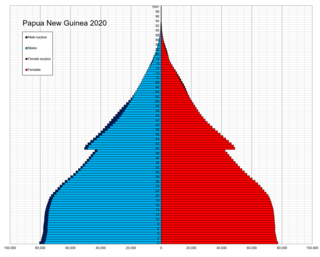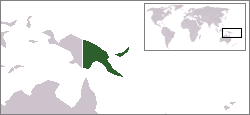Related Research Articles

The indigenous population of Papua New Guinea is one of the most heterogeneous in the world. Papua New Guinea has several thousand separate communities, most with only a few hundred people. Divided by language, customs, and tradition, some of these communities have engaged in endemic warfare with their neighbors for centuries. It is the second most populous nation in Oceania, with a total population estimated variously as being between 9.5 and 10.1 million inhabitants.

Port Moresby, also referred to as Pom City or simply Moresby, is the capital and largest city of Papua New Guinea. It is one of the largest cities in the southwestern Pacific outside of Australia and New Zealand. It is located on the shores of the Gulf of Papua, on the south-western coast of the Papuan Peninsula of the island of New Guinea. The city emerged as a trade centre in the second half of the 19th century. During World War II, it was a prime objective for conquest by the Imperial Japanese forces during 1942–43 as a staging point and air base to cut off Australia from Southeast Asia and the Americas. Due to its population and outsized influence compared to other cities in Papua New Guinea, Port Moresby may be regarded as a primate city.

Lae is the capital of Morobe Province and is the second-largest city in Papua New Guinea. It is located near the delta of the Markham River on the northern coast of Huon Gulf. It is at the start of the Highlands Highway, which is the main land transport corridor between the Highlands Region and the coast. Lae is the largest cargo port of the country and is the industrial hub of Papua New Guinea. The city is known as the Garden City and home of the Papua New Guinea University of Technology.
PNG Air is an airline based on the grounds of Jacksons International Airport, Port Moresby, Papua New Guinea. It operates scheduled domestic and international flights, as well as contract corporate charter work. Its main base is Jacksons International Airport.

In Papua New Guinea (PNG), Australian rules football is a developing team sport which was initially introduced by Australian servicemen during World War II. The governing body for the sport is the PNG Rules Football Council, with the development body being AFL PNG. The junior development version is known locally as Niukick. Regionally, AFL PNG is affiliated with AFL South Pacific with an Australian development pathway through AFL Queensland.
The Bank of Papua New Guinea is the central bank of Papua New Guinea, which has a core mandate to ensure price stability and maintain macroeconomic growth. To achieve this, it discharges four main functions; 1. responsible for the formulation and implementation of monetary policy, 2. ensure financial system development and stability, 3. ensure the payment system remain efficient, and 4. provide a banking role to the Government. It also manages the country's foreign reserves, issue the country's currency, manages the gold and foreign exchange of Papua New Guinea.

Lesbian, gay, bisexual, and transgender (LGBT) people in Papua New Guinea face legal challenges not experienced by non-LGBTQ residents. Male same-sex sexual activity is illegal, punishable by up to 14 years' imprisonment. The law is rarely enforced, but arrests still do happen, having occurred in 2015 and 2022. There are no legal restrictions against lesbian sex in the country.

The Royal Papua New Guinea Constabulary (RPNGC) is a national police force with jurisdiction throughout Papua New Guinea.

In 2009, Papua New Guinea was a source, destination, and transit country for men, women, and children subjected to trafficking in persons, specifically forced prostitution and forced labor. Women and children were subjected to commercial sexual exploitation and involuntary domestic servitude; trafficked men were forced to provide labor in logging and mining camps. Children, especially young girls from tribal areas, were most vulnerable to being pushed into commercial sexual exploitation or forced labor by members of their immediate family or tribe. Families traditionally sold girls into forced marriages to settle their debts, leaving them vulnerable to involuntary domestic servitude, and tribal leaders trade the exploitative labor and service of girls and women for guns and political advantage. Young girls sold into marriage were often forced into domestic servitude for the husband's extended family. In more urban areas, some children from poorer families were prostituted by their parents or sold to brothels. Migrant women and teenage girls from Malaysia, Thailand, China, and the Philippines were subjected to forced prostitution, and men from China were transported to the country for forced labor.

Papua New Guinea (PNG) is often labelled as potentially the worst place in the world for gender-based violence.
Taraka is a suburb of Lae in the Morobe Province, Papua New Guinea. The main campus for the Papua New Guinea University of Technology is located in Taraka.
Tent City (Tent siti) is a suburb of Lae in the Morobe Province, Papua New Guinea. The main campus for the Papua New Guinea University of Technology is located 1 kilometre to the South of Tent City.
Eriku is a suburb of Lae in the Morobe Province, Papua New Guinea.
Bugandi is a suburb of Lae in the Morobe Province, Papua New Guinea.

3 Mile is a suburb of Lae in the Morobe Province, Papua New Guinea.
9 Mile is a large village in the Markham Valley of Morobe Province, Papua New Guinea. It lies along the Highlands Highway 9 miles (14 km) from the center of Lae between the foothills of the Atzera Range and the Markham River. The Atzera Range starts at Bugandi and runs adjacent to the Markham River has an elevation of 280 meters above sea level. northwest of Lae, 7 kilometres (4.3 mi) southeast of Nadzab. The landscape is typically lowland rainforest.

The crime rate of Papua New Guinea is one of the highest in the world.
Tessie Soi is known throughout Papua New Guinea (PNG) as the founder of Friends Foundation. This organization supports people who have HIV/AIDS. She later became involved in supporting victims of family and sexual violence.
Michelle Nayahamui Rooney has dual Papua New Guinean and Australian nationality. She is a research fellow at the Development Policy Centre of the Australian National University and publishes extensively on matters relating to Papua New Guinea (PNG) and the Pacific islands.
Ethnic violence in Papua New Guinea often revolves around inter-tribal warfare.
References
- ↑ Agarwhal, Darham P., Racial/Ethnic and Gender Differences in Alcohol Use and Misuse
- ↑ Constitutional and Law Reform Commission of Papua New Guinea Report on Domestic Violence Archived 2012-03-22 at the Wayback Machine , Papua New Guinea Law Reform Commission, 1992.
- ↑ "Crying Meri". Vlad Sokhin. Retrieved 12 February 2014.